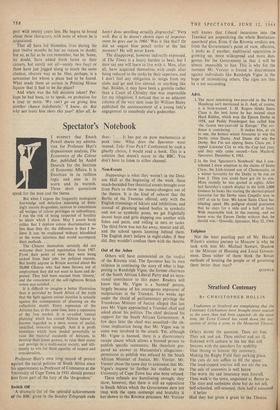Spectator's Notebook
But when I expose the frequently inadequate knowledge and defective reasoning of burn- ingly sincere do-gooders, anxious to exterminate all vestiges of colour privileges or subordinacy,
I run the risk of being suspected of hostility to ideals which I share. May I assure hasty critics that I deplore colour discrimination no less than they do; the difference is that I be- , lieve it, can be eradicated 'without bloodshed or the worse injustices that would accompany their methods. . . .
The Chinese themselves certainly did not welcome their forced repatriation from 1907. From their point of view they were being sacked from their jobs for political reasons. But hardly anyone in Britain worried about the 50,000 Chinese who had been thrown out of employment they did not want to leave and de- ported. They had been rescued from 'slavery,' and the conscience of the self-righteous British voters was satisfied. . .
It is difficult to imagine a better illustration than is provided by South Africa of the truth that the fight against colour injustice is actually against the consequences of planning on the collectivist model. Every repression of the Africans has, at the same time, been a repression of the free market. It is so-called 'central planning' which has caused African labour to become regarded as a mere source of useful, unskilled, muscular strength. And it is profit incentives which have tended powerfully to raise the material- standards of Africans, to develop their latent powers, to raise their status and prestige in a multi-racial society, and ulti- mately to win for them equality of respect and consideration.
Professor Hutt's own long record of protest against the racial policies of South Africa since his appointment as Professor of Commerce at the University of Cape Town in 1931 should protect him from part of the fury of the 'do-gooders.'


































 Previous page
Previous page